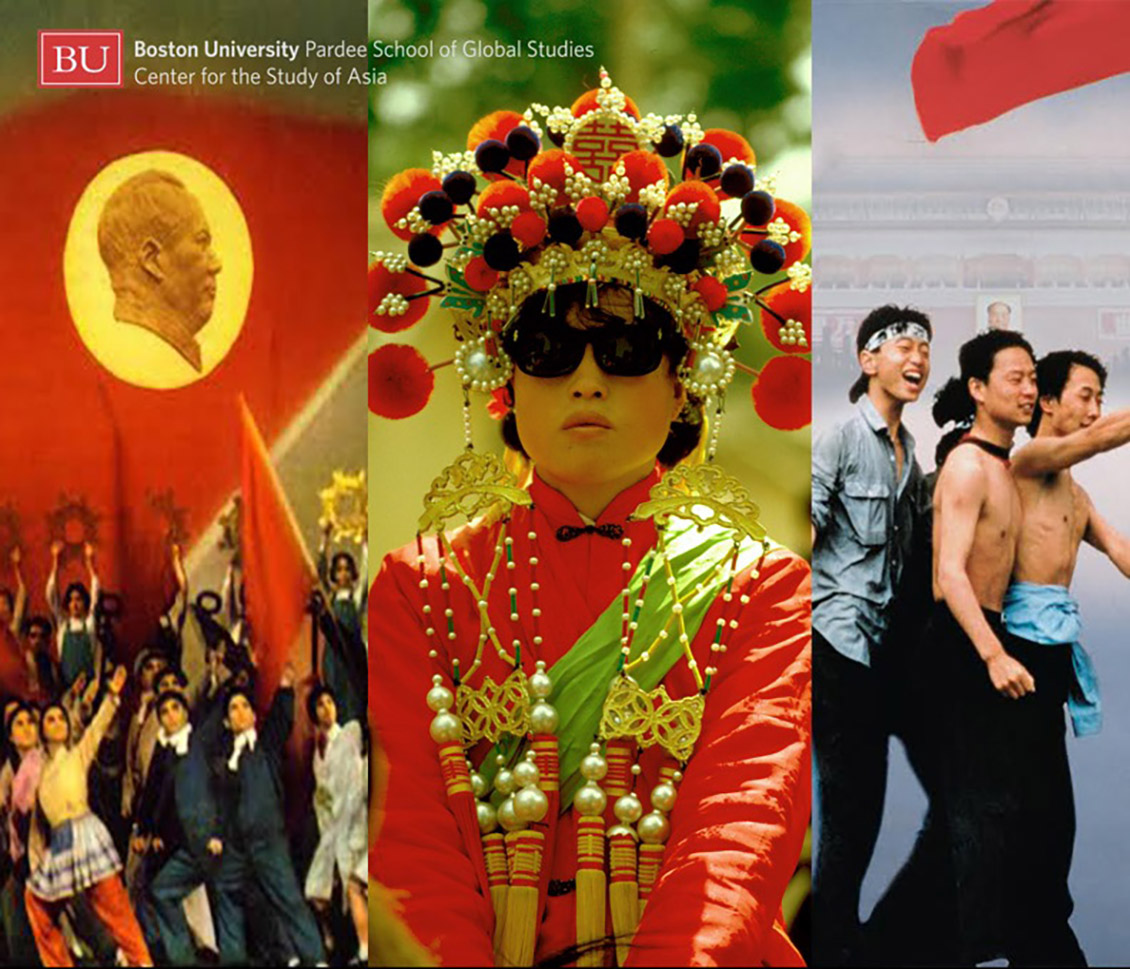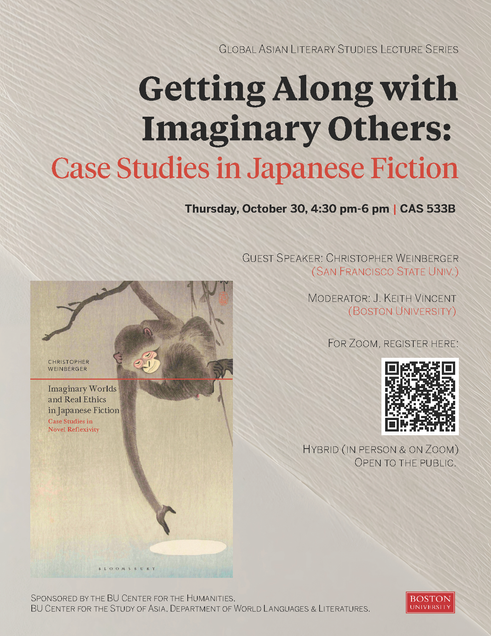History in Images, History in Words: In Search of Facts in Documentary Filmmaking
History in Images, History in Words:
In Search of Facts
in Documentary Filmmaking
A lecture by Carma Hinton
Robinson Professor of Visual Culture and Chinese Studies at George Mason University
Monday April 10, 2017 from 4-7 pm
at the Photonics Center (9th fl.), 8 St. Mary’s Street, Boston University
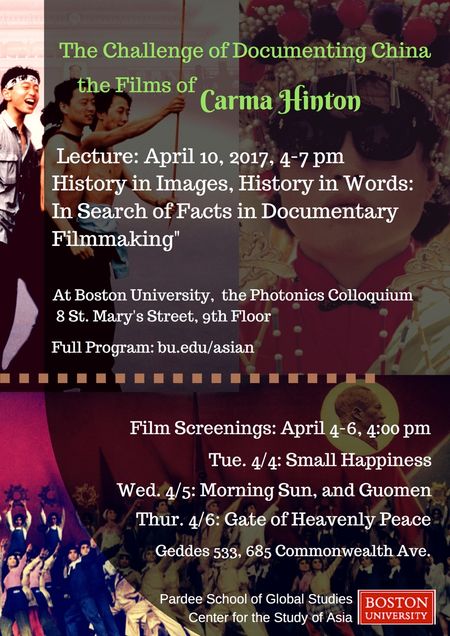 My presentation will focus on the process of documentary filmmaking, especially the many challenges my team and I faced in trying to create engaging filmic narratives that are both factually accurate and encompass multiple perspectives. I will use excerpts from my films as well as out-takes to illustrate the difficulties in determining what information to include and exclude, assess the compromises involved in the choices, and explore the consequences of taking various possible paths. I will also address the different problems that a historian encounters when presenting history in images as opposed to in words: the potential and limitation of each medium and what information each might privilege or obscure. I believe that in this age of “alternative facts” and “parallel universes,” reflections on the challenges in obtaining authenticity and truth and the importance of relentlessly striving to reach this goal, take on particularly urgent meaning.
My presentation will focus on the process of documentary filmmaking, especially the many challenges my team and I faced in trying to create engaging filmic narratives that are both factually accurate and encompass multiple perspectives. I will use excerpts from my films as well as out-takes to illustrate the difficulties in determining what information to include and exclude, assess the compromises involved in the choices, and explore the consequences of taking various possible paths. I will also address the different problems that a historian encounters when presenting history in images as opposed to in words: the potential and limitation of each medium and what information each might privilege or obscure. I believe that in this age of “alternative facts” and “parallel universes,” reflections on the challenges in obtaining authenticity and truth and the importance of relentlessly striving to reach this goal, take on particularly urgent meaning.
About the speaker:
Carma Hinton is an art historian and a filmmaker. She received her Ph.D. in Art History from Harvard University and is now Robinson Professor of Visual Culture and Chinese Studies at George Mason University. Together with Richard Gordon, Hinton has directed many documentary films, including Small Happiness, All Under Heaven, To Taste a Hundred Herbs, Abode of Illusion: The Life and Art of Chang Dai-chien, The Gate of Heavenly Peace, and Morning Sun. She has won two Peabody Awards, the American Historical Association’s John E. O’Connor Film Award, the International Critics Prize and the Best Social and Political Documentary at the Banff Television Festival, and a National News & Documentary Emmy, among others. Hinton is currently working on a book about Chinese scrolls depicting the theme of demon quelling. Carma Hinton was born in Beijing. Chinese is her first language and culture.

10/2/2025 – Film Screening: “Made in Ethiopia”
Thursday, October 2, 2025
Film Screening: "Made in Ethiopia"
5 PM - Screening
7 PM Q&A with Directors
8O8 Commonwealth Ave., 1st Floor, Boston MA
Filmed over four years with singular access, "Made in Ethiopia" lifts the curtain on China’s historic but misunderstood impact on Africa, and explores contemporary Ethiopia at a moment of profound crisis. The film immerses viewers in two colliding worlds: a booming industrial powerhouse driven by profit and progress, and a disappearing countryside where life is still guided by the rhythm of the seasons. Co-organized by the Boston University African Studies Center, African Studies Library, Center for the Study of Asia and Global Development Policy Center, the event will feature a 90-minute film screening followed by a 30-minute Q&A with directors Xinyan Yu and Max Duncan.
The screening is sponsored by the BU African Studies Center, BU Center for the Study of Asia, and the BU Global Development Center.
10-14-2025 – “The Dawn is Too Far” A Film Screening and Discussion with Persis Karim
Tuesday, October 14, 2025
5 PM - 6:30 PM
Fuller 206, 808 Commonwealth Ave., Boston MA
Please Register here.
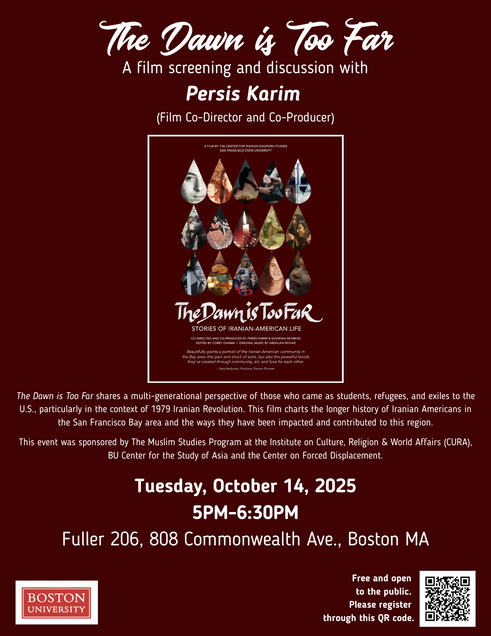
The Dawn is Too Far: Stories of Iranian-American Life poetically narrates the story of a community of Iranian Americans who have made the San Francisco Bay Area their home over the past five decades. The film seeks to expand our understanding of Iranian immigration —what it means to leave home and country—and live through the episodes of turbulent histories of dissent, revolution, war, and separation––and reinvent oneself in a new place, country, and culture. The Dawn is Too Far does not paint a story of salvation and happy assimilation, but rather seeks to identify the complex ways that members of the Bay Area's Iranian diaspora community have navigated the challenges and traumas of history—both Iranian and American––to reinvent themselves and tell their own stories; these as yet untold stories build on a longer history of Iranian immigration to Northern California, where Iranians as students, activists, artists, draw on as well as influence the larger culture of the Bay Area. This community and all that it has faced, offers a more nuanced story of the Iranian diaspora—the ways that this community enriches and enlivens the region where they live, work, and build families and community. The Dawn is Too Far undermines the tired and overplayed news headlines that are dominated by narratives of enmity and mistrust between the government of Iran and the U.S., to offer a more humane understanding of the how people's lives and the sacrifices they make are part of the larger story of immigration.
Persis Karim (executive produce and co-director/co-producer) is an Iranian-American writer, poet, and professor at San Francisco State University. She grew up in the San Francisco Bay Area, the daughter of an Iranian father who came here in the immediate aftermath of Iran’s military occupation by British and Soviet troops during World War II. She came of age during the 1979 Iranian Revolution and felt a deep concern for how Iran was represented in the media, defying what she experienced in her family and the larger community of Iranian Americans. She has been engaged with the Iranian diaspora community here for more than 30 years in her capacity as a professor, first at San Jose State University, where she founded the Persian Studies program, and then currently as the Director for the Center for Iranian Diaspora Studies at San Francisco State University. She has written extensively on the culture and literature of Iranian Americans and is the editor of three anthologies of Iranian diaspora literature: A World Between: Poems, Short Stories, and Essays by Iranian Americans (1999); Let Me Tell You Where I’ve Been: New Writing by Women of the Iranian Diaspora (2006); and, Tremors: New Fiction by Iranian-American Writers (2013). She also piloted a digital archive of Bay Area Iranian Americans on the DIVA site at SF State as well as did a digital storytelling Karim has worked actively to support and help build the Iranian diaspora community in the Bay Area—largely through her literary and cultural activism. She has watched over three decades from the seat of observer-participant as this community has evolved and grown, welcoming younger generations into it.
Soumyaa Behrens (co-director/co-producer) is an award-winning South Asian Bay Area filmmaker whose work is defined by an attention to women, people of color, and immigrant and marginalized communities. Behrens has directed three other films and is active in the Bay Area film and video community. She teaches documentary filmmaking at San Francisco State University and directs the DocFilm Institute. Behrens spent her childhood traveling back and forth between Illinois and India and the many airports in between. Behrens’s Indian parents were part of an accidental diaspora. They raised Behrens and her other Americanborn sisters, and successfully brought their father’s brothers and families to the U.S. where many of them set down roots. Behrens shares significant personal experiences that mirror those of the Iranian Americans in this film.
10-20-2025 – The Vietnamese Áo Dài in a Time of War: Fashion, Citizenship, and Nationalism (1954–1975) with Ann Marie Leshkowich and Martina Thucnhi Nguyen
Monday, October 20, 4 PM-5:30 PM
121 Bay State Road, Boston MA
Please register here.
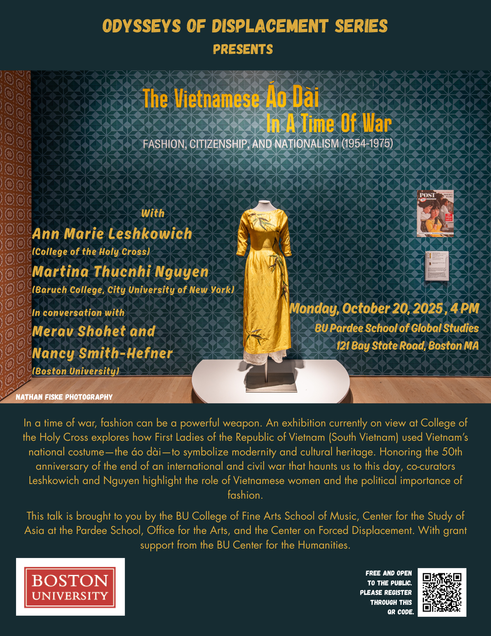
In a time of war, fashion can be a powerful weapon. An exhibition currently on view at College of the Holy Cross explores how First Ladies of the Republic of Vietnam (South Vietnam) used Vietnam’s national costume—the áo dài—to symbolize modernity and cultural heritage. Honoring the 50th anniversary of the end of an international and civil war that haunts us to this day, co-curators Leshkowich and Nguyen highlight the role of Vietnamese women and the political importance of fashion.

Ann Marie Leshkowich is Professor of Anthropology at College of the Holy Cross. She researches gender, economic transformation, class, fashion, and social work in Vietnam. She is author of Essential Trade: Vietnamese Women in a Changing Marketplace (University of Hawai‘i Press, 2014; awarded Harry J. Benda Prize, 2016) and co-editor of Traders in Motion: Identities and Contestations in the Vietnamese Marketplace (Cornell University Press, 2018), Neoliberalism in Vietnam (positions: asia critique, 2012), and Re-Orienting Fashion: The Globalization of Asian Dress (Berg, 2003). Her research has been published in American Ethnologist, American Anthropologist, Journal of Asian Studies, Journal of Vietnamese Studies, and Fashion Theory.
Nguyen, Leshkowich, and Tuong Vu (University of Oregon) are co-curators of the exhibition, "The Vietnamese Áo Dài in a Time of War: Fashion, Citizenship, and Nationalism (1954–1975)," on view at College of the Holy Cross (Worcester, MA) through December 19, 2025.
Martina Thucnhi Nguyen is Associate Professor of History at Baruch College, City University of New York. She is the author of On Our Own Strength: The Self-Reliant Literary Group and Cosmopolitan Nationalism in Late Colonial Vietnam.
10-27-2025 – Song of Earthroot: Film Screening and Talkback with Kinh Vu
Monday, October 27, 7 PM
Room 104, 808 Commonwealth Ave, Brookline, MA
Please register here.
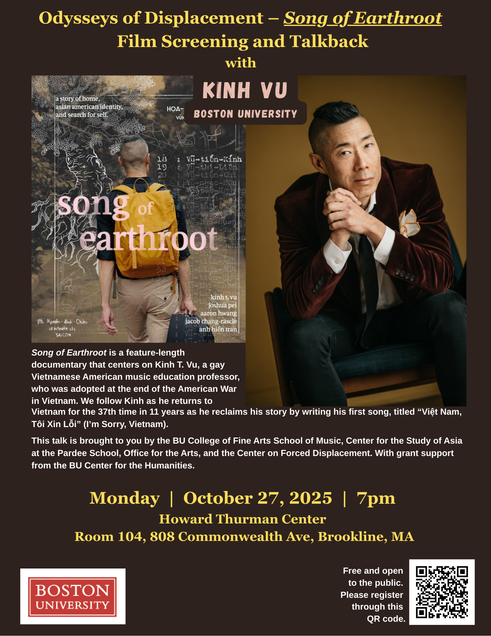
Song of Earthroot is a feature-length documentary that centers on Kinh T. Vu, a gay Vietnamese American music education professor, who was adopted at the end of the American War in Vietnam. We follow Kinh as he returns to Vietnam for the 37th time in 11 years as he reclaims his story by writing his first song, titled “Việt Nam, Tôi Xin Lỗi” (I’m Sorry, Vietnam).
This story is not about an adoptee’s search for birth parents, blood belonging, or adopted belonging. Nor is it about the “heroism” of the West for saving kids via adoption - that white saviorism is best left for another author. Instead, this film is a yearning to re-assimilate and reconnect to roots, even in his middle age. Kinh attempts a rejection of the Western socialization forced upon him when he was adopted, paired with much deeper reluctance or perhaps inability to do so. There is guilt, driven by shame. There is delusion, driven by ego. There is the universal struggle to self actualize desperately as he grows older but fights to remain young at heart. Through song and conversation, we follow Kinh as he writes what he feels is the last piece of the puzzle before he can buy a one way ticket to return Home.
10-30-25 – From Refugees to ‘Non-Criminal Collaterals’: Immigration after the Vietnam War and Now with Ben Tran
Thursday, October 30, 2025
4 PM - 5:30 PM
120 Bay State Road, Boston MA
Please register here.

This lecture explores the contrasting policies directed at refugees following the Vietnam War and the racialized criminalization of migrants today. It analyzes how the socio-political climate of the late 1970s and 1980s facilitated a relatively robust support system for Vietnamese refugees in the United States, characterized by humanitarian aid, community-building efforts, and federal programs aimed at integration. In contrast, the immigration landscape in the US today is more draconian, influenced by shifting political narratives and contexts. This paper further compares these differences by underscoring Vietnam’s post-civil war nation-state and the history of Asian migrants to the US. Contemporary capitalism, the paper argues, has reached a new register of profiteering from and exploitation of "illegal aliens.”
This talk is brought to you by the BU College of Fine Arts School of Music, Center for the Study of Asia at the Pardee School, Office for the Arts, and the Center on Forced Displacement. With grant support from the BU Center for the Humanities.

Ben Tran is Associate Professor of Asian Studies and English at Vanderbilt University. He researches and teaches the politics and aesthetics of twentieth- and twenty-first century Southeast Asian, Asian American, and Anglophone literatures. He is the author of Post-Mandarin: Masculinity and Aesthetic Modernity in Colonial Vietnam (2017); and his work has been published in Cultural Critique, PMLA, positions: asia critique, Modern Fiction Studies, and The Oxford Handbook of Global Modernisms. Ben Tran’s current scholarship has two trajectories. The first project traces how the biological necessity of breathing has become a universal right to breath that we must now fight for, amid the weaponization of the atmosphere, increasingly transnational police tactics, and the history of air conditioning. The second, entitled Digital Coolie-ism, examines how Asian migration during 19th-century European imperialism intersects with the current border-control system and the increasing use of biodata.
10-30-2025 Getting Along with Imaginary Others: Case Studies in Japanese Fiction with Christopher Weinberger
Thursday, October 30, 2025, 4:30 PM – 6 PM
CAS 533B, 685 Commonwealth Avenue, Boston, MA 02215
Hybrid - also via Zoom. Register HERE.
Can novels contribute to the ethical lives of readers? What responsibilities might they bear in representing others? Are we ethically accountable for how we read fiction? Modern Japanese novels and contemporary metafiction, neither of which have figured centrally in Anglophone scholarship on novel ethics, offer innovative answers to these and other questions.
This talk will offer new readings of seminal works of Japanese literature to demonstrate how their metafictional strategies can provide new perspectives on contemporary concerns, including debates about identification and empathy, the representation of alterity, and widespread disagreement about whether novel ethics consists in the manner of reading, the effects of reading, or the content of novel representation. We will briefly trace the development of an overlooked “ethical reflexivity” in the fiction of modern writers often critiqued for ethical failures: Mori Ōgai (1868-1922) and Akutagawa Ryūnosuke. The talk will then focus on the relevance of their work for the contemporary moment through analysis of a writer whose ethics continue to provoke debate: Murakami Haruki (1949--). In the end we find a startling continuity between the methods of Japan’s novel progenitors and some of the supposedly recent innovations of metamodernism as well as an original methodology for the further study of world literature.
11-01-2025 – The Odyssey, Music by Vân-Ánh Vanessa Võ, Blood Moon Orchestra, and Arneis Quartet
Saturday, November 1, 2025, 7:30 PM
Music by Vân-Ánh Vanessa Võ, Blood Moon Orchestra, and Arneis Quartet
Boston University Tsai Performance Center
685 Commonwealth Ave, Boston, MA 02215
OPEN and FREE to the public.
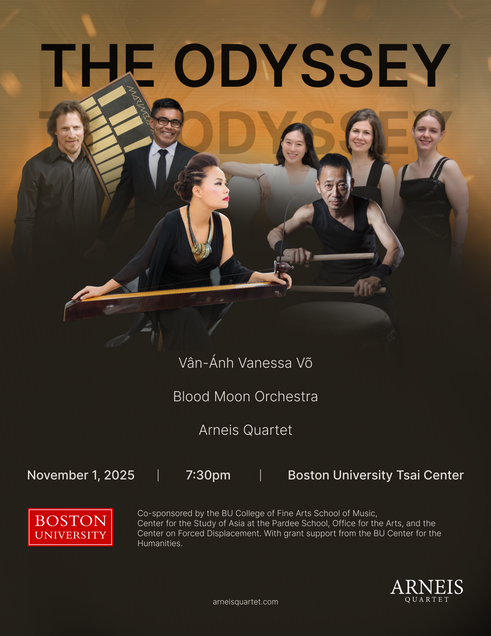
11-4-2025 – Learning from Japan: Expos Past, Present, and Future with Angus Lockyer
Tuesday, November 4, 2025
4 PM - 5:30 PM
121 Bay State Road, Boston MA
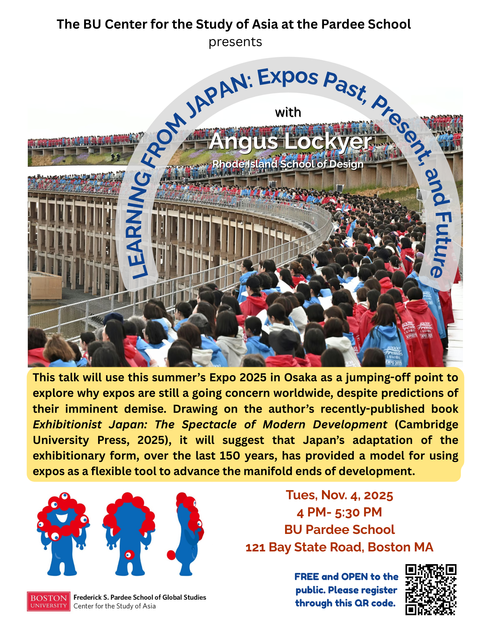
This summer saw crowds flocking to Expo 2025 on a reclaimed island in Osaka Bay. This may be a surprise, given its absence in the western media and the assumption among many that the age of expos is over. In this talk, we'll explore why expos are still a going concern. We'll start with a report from Osaka, then travel back in time, to understand how Japan got there, adopting the form of modern expos from the West in the 19th century, but also adapting it over the course of the 20th as a tool for development. Drawing on a recently-published book, the story will take us from early 18th-century exhibitions -- materia medica, exotic animals, animated puppets, and revealed deities -- through industry and empire, war and peace, technology and environment. We won't have time to look at all the 1,300-plus expos Japan has seen in the last 150 years. But we'll see enough to understand how Japan's use of them has served its own needs, and provided a model that continues to be adopted beyond its borders.
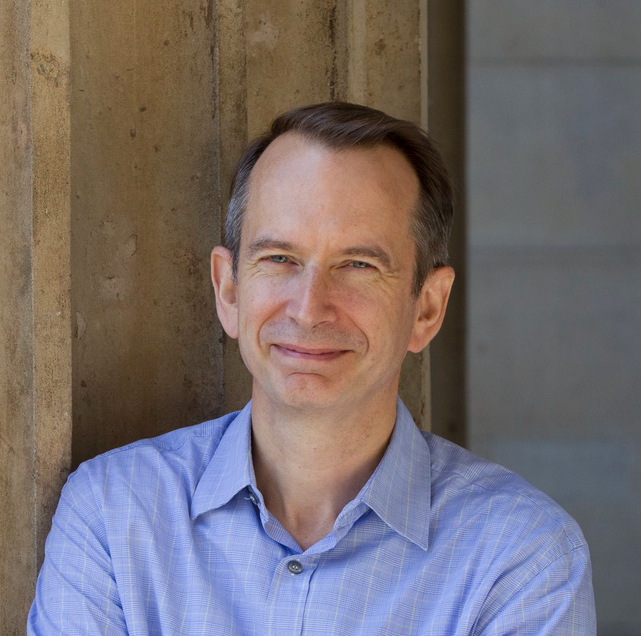
Angus Lockyer was educated in Dorset, Cambridge, Seattle, and California, and has taught Japanese, East Asian, and global history in North Carolina and London. Exhibitionist Japan: The Spectacle of Modern Development was published by Cambridge University Press earlier this year. Japan: A History in Objects, based on the collection of the British Museum, will come out from Thames and Hudson in early 2026. He currently lives in Rhode Island and teaches at RISD.
11-06-25 – The Backstage of Democracy: India’s Election Campaigns and the People Who Manage Them with Amogh Dhar Sharma
Thursday, November 6, 2025
4 PM - 5:30 PM
121 Bay State Road, Boston MA
Please register here.

